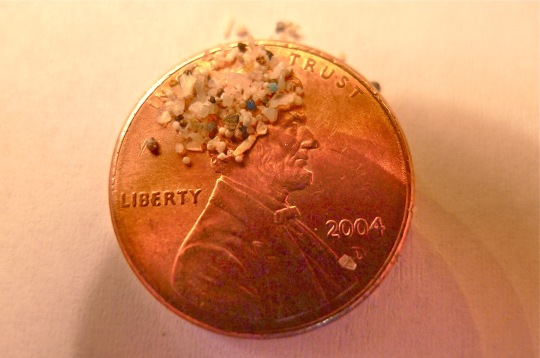 A sample of microbeads collected in Lake Erie. | Photo courtesy 5gyres.org
A sample of microbeads collected in Lake Erie. | Photo courtesy 5gyres.org
Microbeads in beauty products are causing big problems in lakes, rivers and wrecking havoc on our skin, too
While companies might not even list them on the label, microplastics (or microbeads) are a common ingredient in thousands of today’s beauty products, including skin-exfoliating cleansers and toothpaste. Referred to as “polyethylene” or “polypropylene,” these microbeads are made from plastic and have been used to make beauty products for nearly five decades, and without assessment of their effect on the environment, the Independent’s Steve Connor and Zander Swinburne report. Hidden behind the brightly colored bottles and low prices is an alarming impact.
BeattheMicrobead.org explains that when microbeads are washed down the drain after use, these nearly invisible, non-biodegradable microplastics are polluting the world’s oceans. Because of their minute size, microbeads cannot be filtered out of modern wastewater treatment systems. Sea creatures consume or absorb these microbeads through the lining of their gut or lungs, which, Connor and Swinburne write, soak up toxins like nonylphenol, phenanthrene and Triclosanand, passing them along the food chain, ultimately back to the humans who eat seafood.
Tens of millions of these microbeads have already infiltrated the Great Lakes, according to New York Times writer John Schwartz. And more alarming is that there is currently no way of removing existing microbeads out of the water—skimming the lakes to filter out the plastics could destroy plankton and other vital sea life.
In a bid to limit microbead use, many companies have pledged to remove them from their products, and some governments and politicians, including Illinois Governor Quinn to the Dutch Parliament are taking steps to prohibit microbead production. According to Beat the Microbead, Johnson & Johnson, Unilever, Procter & Gamble, the Body Shop, IKEA, Lush and L’Oréal, among others, are all in varying processes of removing microplastics from products due to harsh environmental impacts and pressure from their customers.
Penny Ordway, owner of Eviama Life Spa in Philadelphia, thinks that this beauty craze is alarming in a time where our world so desperately needs to reduce. She adds that extreme exfoliation, especially by using products that contain microplastics, is damaging to the skin. “They might make you feel like you look better, [but] in the short run, you’re making yourself more photosensitive, you are diminishing your immune system, and you are causing an emergency in the body,” she says. “Any strong exfoliant is going to tear the skin. This one is a little more demonic because of the impact on the environment.”
Priya Narasimhan, owner of Priya Means Love, agrees. “It seems totally intuitive that you don’t want to be exposing skin to plastic,” she says. “You’re making your skin vulnerable by exfoliating, and plastic exposing you to all sorts of chemicals. … What are you applying to your skin?”
Ilka Evans, owner of Zoet Bathlatier, says, “It’s just a gimmick. There are so many things you can make for an exfoliant that are natural, I don’t think it’s necessary.”
So, try some DIY recipes, or track down the plenty of amazing, natural and local products are available in and around Philadelphia. For her handmade products, Narasimhan says she uses oats, apricot kernels, sugar, salt and coffee—ingredients that are gentle, good for sensitive skin, and even enjoyable to use. Even more, she adds, “I used to sell a sugar scrub, but eventually decided to encourage people to make their own. It’s really simple and empowering to realize you don’t need to rely on companies for something that works really well. I’ve been encouraging people to use spent coffee grounds, which is such a green solution.”
Evans describes her products as natural and not harmful to the environment, and adds, “You’re using small batches, there’s more love that’s put into it, more time that’s put into it. … I don’t feel like you need to go too crazy coming up with all these chemicals to use on your face—just keep it simple.” Ordway recommends being gentle with your skin above all: “Just trust that your skin knows what it’s doing. Your body has magic. We are just here to facilitate.”
To avoid purchasing items with microbeads, look for “polyethylene” or “polypropylene” on product labels. Or, download the Beat the Microbead App. It uses your smartphone camera and the product barcode to check for microbeads. The app can be found in the iTunes App store, Google play, and the Windows Phone Store.
Story by Sylvie Luzio
A natural solution- Priya Means Love’s Lavender Face Scrub gently exfoliates, nourishes and cleanses using organic oats, sugar and lavender buds.







Thank you for this information. I didn't know this and glad you have informed us.
Actually, like in tooth paste which like exfoliants also has to be slightly abrasive, they use inorganic minerals which would not pose any of these problems. If washed down the drain they simply get reunited with the soil they eventually originated from.
beautiful article and tips for me i m very beuti conscious about my health..
Dikke Darm